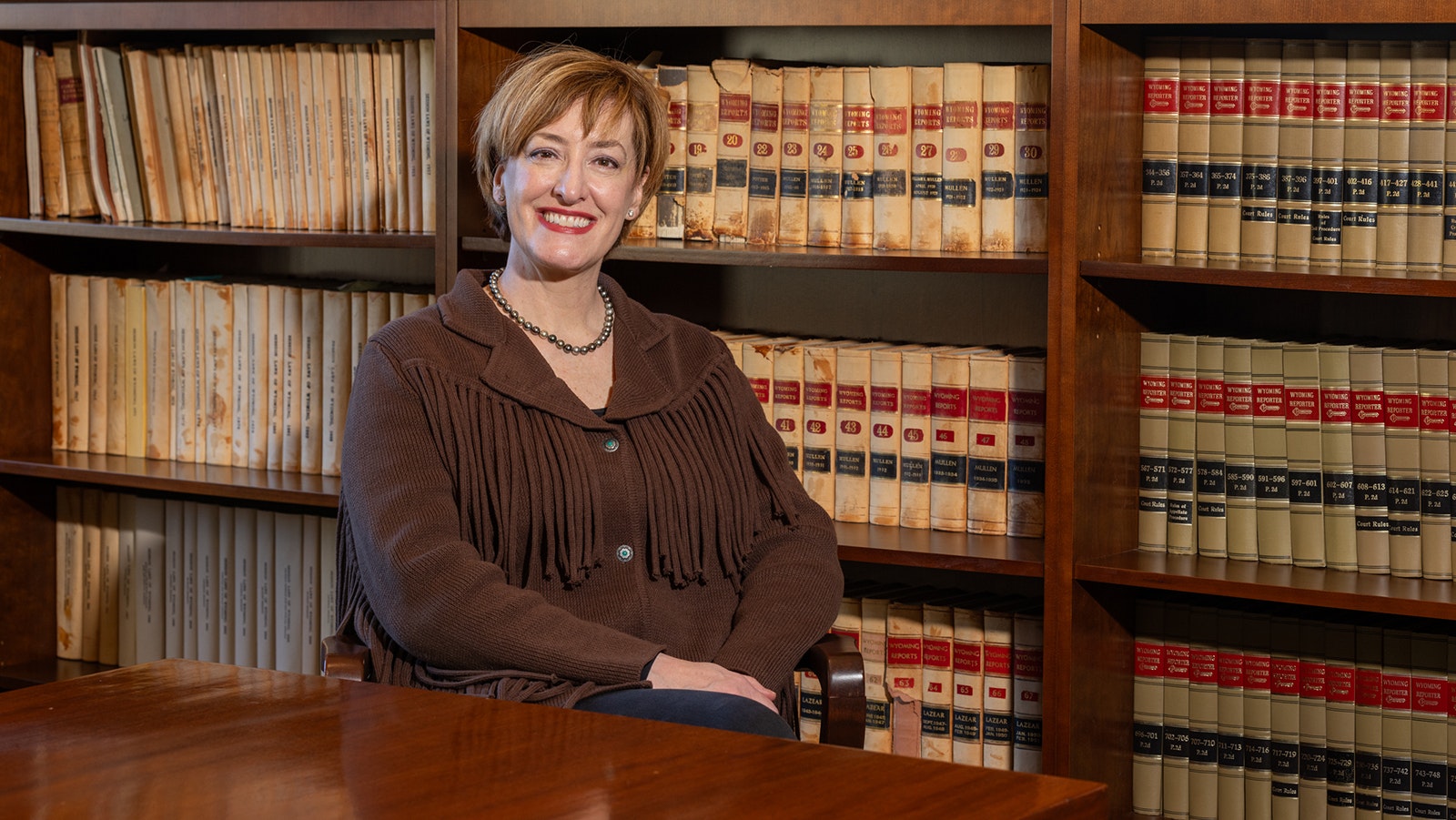Battle lines are being drawn between the Wyoming Banking Association and Wyoming’s Select Committee on Blockchain, Financial, Technology and Digital Innovation Technology.
The rift was exposed during the blockchain committee’s September meeting during a Tuesday afternoon’s session, with some Wyoming lawmakers on the committee saying it doesn’t seem that Wyoming Banking Association is behind the state’s efforts.
“I mean, talk about failing to ride for the brand,” Sen. Chris Rothfuss said during the committee hearing. “I can’t believe we’re in this position where we’ve been in this process for six, almost seven years, working on Special Purpose Depository Institutions to try and build something for the state, and then to be attacked from the inside.
“That is disheartening to see that, particularly when, as you know, you can see why large out-of-state banks would want to stop (Wyoming’s) progress, because they want to get there first.”
Rothfuss’ comment came after the Wyoming Banking Association filed a friend of the court brief in the Custodia Bank case that is directly opposite of the state of Wyoming’s own position in the case.
Custodia Bank is what’s called a Special Purpose Depository Institution or “speedy bank.” Wyoming enacted these digital asset banks in 2019 to serve as custodians of things like bitcoin, as well as a bridge for the money tied up in them.
Developing Wyoming’s law involved many stakeholders and meetings, including more than 100 meetings with the Kansas City Federal Reserve, to gain their blessing on Wyoming’s framework.
Initially, all seemed to be going well for Wyoming’s speedy banks.
But not long after the Biden administration took over, Custodia found itself fighting with the Federal Reserve for what’s called a master account. That’s a bank account for banks, which allows financial institutions to more readily make financial transfers at significantly lower costs.
While there were no red flags raised initially, Custodia soon found itself being stone-walled when it came to its master account.
Wyoming has filed a friend of the court brief in Custodia Bank’s appeal of a lower court’s ruling that the Federal Reserve does have the discretion to reject master accounts for legal, state-chartered banks to protect its sovereignty.
A loss in the case would mean, in all practicality, that Wyoming — or any other state for that matter — has no real discretion to make its own state banking laws. They would all be subject to the Federal Reserve’s blessing for a master account.

Outside Influence?
Rothfuss wasn’t alone in his sentiments about the Wyoming Banking Association’s actions in the Custodia Bank case.
Other members of the committee also expressed surprise and frustration with the brief that the Wyoming Banking Association filed.
“Quite honestly, I’m surprised what has gone on,” said Sen. Dan Furphy, D-Laramie. “When I was working on this issue, I visited with a lot of the state banks, and they were supportive of the speedy bank. So I must be out of touch because, as I said, they were supportive at that point. If they’ve changed their position, I would like to understand that personally, why?”
Sen. Tara Nethercott, R-Cheyenne, called it “deeply concerning,” and that she looks forward to hearing from Wyoming Banking Association about why it did what it did.
“I do not know who they’re serving or what they’re trying to accomplish,” Rothfuss told Cowboy State Daily on Thursday. “But it’s really disappointing to see them vocally and actively countering our efforts to diversify the Wyoming economy and move us to the forefront and keep us at the forefront of financial technology and digital innovation through blockchain, and in particularly, through SPDI (pronounced speedy) banks.”
Rothfuss said it appears to him that the Wyoming Banking Association is being influenced by larger banks outside of Wyoming.
“The big banks are worried about disruptive technologies until they own the technology and control it,” Rothfuss said. “So, you see the large financial institutions pushing very hard against any innovation through upstarts like the state of Wyoming.”
But, while they’re claiming to protect the stability of banking from one side of their mouth, with the other side they’re busy working to develop the very same kinds of products that Custodia Bank has been trying to develop through Wyoming’s regulatory framework for digital assets, Rothfuss added.
“What they really want is to get to the point where they’ve institutionalized all of it, and there’s no possibility for their business to be disrupted by it,” Rothfuss said. “They’ve been exceptional historically at protecting their financial interests at the cost of innovation, the consumer, the public. And that’s what we’re seeing here, where they’re working against the interest of the state of Wyoming to ensure they’re protecting and preserving their own profits.”
Wyoming Banking Association: Fed Should Have Discretion
Wyoming Banking Association President and CEO Scott Meier told Cowboy State Daily the purpose of the Wyoming Banking Associations’ friend of the court brief was to express its opinion that issuing a master account should be at the discretion of the Federal Reserve, for the good of the overall banking system.
“I think our positions, as we looked at it and from banking in general, the question is always one of safety and soundness of the banks,” he said. “And it’s not just Wyoming banks, it’s all banks.”
Meier also said Wyoming Banking Association is not comfortable with speedy banks being allowed to opt out of FDIC insurance.
The banks are required to hold 100% of their assets in reserve, Meier acknowledged, and aren’t allowed to make loans with customer deposits. But FDIC insurance comes with some additional rules and regulations aimed at enhancing the safety of the banking system.
“There are regulations they have to follow if they’re going to have that insurance,” Meier said. “When you don’t have FDIC insurance, you don’t have to. And the idea in our brief was that we don’t, we’re not supporting the feds, and we’re not supporting the speedy banks. We’re supporting the rule of law that these regulations are out there for a purpose, and that’s to protect the safety and soundness of banking.”
If SPDI banks don’t want to follow the rules that all banks follow, Meier suggested, perhaps they shouldn’t be considered banks at all.
“We have voiced our opinion about that,” Meier said. “And it was not heeded. But there’s a lot of states that are kind of trying to follow this model but are specifically saying you can’t be called a bank.”

Not Having A Master Account Has Cost Custodia Millions
Custodia Bank CEO Caitlin Long told the blockchain committee she found it telling that large parts of Wyoming Banking Association’s brief borrowed wholesale wording in the American Banking Association’s brief, and also suggested that outside interests are at work.
“Why would Wyoming bankers join the attack on the state of Wyoming by the Fed and the national lobbyists, rushing to submit a brief that cribbed from the American Bankers Association brief, when Wyoming’s incumbent banks have not been harmed in any way by the state’s blockchain initiatives?” Long asked. “And after every individual banker on the Wyoming State Banking Board voted yes to charter every single Wyoming speedy bank. I think you can all see the forces from outside Wyoming at work here.”
Long also said that seven other states have become involved lately in bills that aim to stop debanking citizens and politically unpopular, but legal, businesses by locking them out of financial institutions, and suggested Wyoming should consider joining them.
“Debanking treats law-abiding citizens like criminals,” she said. “But states can set them free.”
Long said Custodia’s case is set for a hearing in the November-December timeframe and, that to date, not having a master account has cost the small bank $8 million in costs. That doesn’t count lost business.
“This is a crushing sum for a small bank,” she said. “And what’s ironic is that Custodia has a clean compliance record, which the Fed knows, because Fed examiners have actually reviewed every single transaction across time periods and found no issues.”
Custodia is also in good standing with Wyoming Division of Banking, she added, with no enforcement actions taken.
“I’m very proud of our team’s performance in our regulatory exams,” she said. “The Fed has been ratcheting up their efforts to crush a small competitor. What is so scary to you about a small, woman-owned bank in Wyoming operating in the very business you claim is so risky, while the big New York banks are simultaneously rushing to enter those same businesses?”
No Opinion On Borrowed Wording
Meier told Cowboy State Daily he had no opinion about the brief borrowing wording from the American Banking Association brief.
“I’m not going to address the issues on what the attorney wrote in there for us,” he said. “I didn’t write it. I didn’t sign it. That’s not my purview.”
What he feels is his purview is the position Wyoming Banking Association is taking that master accounts should be made at the Federal Reserve’s discretion.
As for whether the Federal Reserve is treating Custodia Bank differently than New York banks, Meier said he didn’t have enough information to assess that.
“I don’t know the primary parameters of why the Fed allows them to do whatever they do,” Meier said. “I don’t know what their business model looks like. I don’t know what their procedures are. I don’t know what they do so far, and I don’t think Miss Long, or the committee, knows what the New York banks do either.
“To just surmise, by the fact that they got one and we didn’t and so it’s unfair, is in itself an unfair statement. You don’t know what benchmarks or measuring tools they have.”
Meier said he believes that a speedy bank’s designation as a Tier 3 bank by the Federal Reserve reflects a lack of regulation that’s tied to the fact they don’t have to obtain the FDIC insurance that comes with additional safety requirements.
“It is the purview of the Feds to say, in this case, we don’t believe that that master account is warranted,” Meier said. “So, if that’s the case, then that’s their decision, and that’s what we’re supporting, is their ability to weigh each individual bank that applies for these master accounts and make that determination whether it’s a Tier 1, 2, or 3 bank. That’s their call.”
That doesn’t mean, Meier added, that the Wyoming Banking Association is opposed to speedy banks.
“We are advocating for the rule of law,” he said. “We believe that the rule says it’s the discretion (of the Fed). That’s why it’s in front of the courts. Is it discretionary or not? It has nothing to do with whether we’re in support of or against any of these banks.”
Meier also said that the approval of speedy bank applications has more to do with whether an applicant has met state requirements than approval or disapproval of the overall business model.
“If the applicant meets those requirements, then the state banking board must give them a charter,” Meier said. “Whether you like them or don’t like them is irrelevant. The state banking board had to follow the law. If they don’t, they could be sued individual for failing to follow the law.”
Renée Jean can be reached at renee@cowboystatedaily.com.





